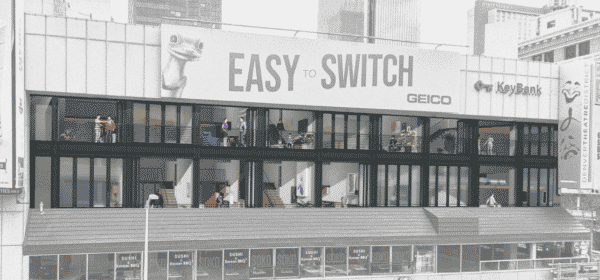
The 1600 Champa building currently features office space on the upper two floors. Kresher Capital purchased the building in 2014 for $21.75 million, records show. Photo by Thomas Gounley.
A four-story building along the 16th Street Mall is the second in downtown Denver to be recently eyed for a potential office-to-residential conversion — something that the city is looking to encourage.
Kresher Capital, which owns the building at 1600 Champa St., submitted plans for the conversion to the city last week.
The plans call for the top two floors of the building, currently office space, to be fashioned into a total of 40 apartments, ranging in size from 470 to 1,135 square feet. Some of the units on the top floors would feature a mezzanine level.
The interior of the floors, away from the windows, would feature storage, fitness and other amenity space.
The building is about 72,000 square feet, according to property records. The bottom two floors, along with a basement level, are home to retail space. Tenants there include a liquor store, multiple restaurants and a gift shop.
The structure also has several electronic billboards, including a large one right on the corner overlooking the mall. The plans indicate those billboards would remain in place.
Kresher, which purchased the 1600 Champa St. building in 2014 for $21.75 million, didn’t respond to requests for comment. A call to Bryant Flink Architecture & Design, which drew up the plans, also was not returned.
On a national level, the idea of converting downtown offices into residential space has gained interest in recent years, with more people working from home and city centers struggling to return to pre-pandemic levels of vibrancy.
In December, the owners of the Petroleum Building, a 14-story structure at 110 16th St., submitted plans for turning its upper 13 floors of office space into approximately 130 residential units. No physical work has begun.
Conversion isn’t necessarily easy. Office buildings tend to have higher ceiling heights than residential ones, and their floors are often wider, making it difficult to fashion into units that all have a window without significant unused space.
The city, however, thinks some conversion would be a good idea.
Laura Swartz, spokeswoman for Denver’s Community Planning and Development department, told BusinessDen that Denver is creating an adaptive reuse program targeting older “Class B” and “Class C” office buildings.
While the decision to convert space will have to be made by a building owner, the city wants to ensure it isn’t posing any unnecessary obstacles.
“To that end, city staff have begun working with owners/operators of these types of buildings with the goal of identifying and removing regulatory barriers to help encourage these types of conversions,” Swartz said. “This work is still early right now, and we would expect to have potential code or process updates to share in about a year.”
Swartz cited the fact that many employers have embraced hybrid work policies, meaning employees aren’t in the office Monday through Friday.
“The city believes there is an opportunity here to help create a more complete neighborhood downtown with more housing options by focusing on the vacant commercial and office space,” she said. “Reusing existing building stock is also a more environmentally friendly and cost-effective approach to construction.”
The most prominent example of an office-to-residential conversion downtown is 1600 Glenarm Place. Denver-based RedPeak purchased the 31-story office building in 2004, fashioned it into apartments and sold it in 2018.

The 1600 Champa building currently features office space on the upper two floors. Kresher Capital purchased the building in 2014 for $21.75 million, records show. Photo by Thomas Gounley.
A four-story building along the 16th Street Mall is the second in downtown Denver to be recently eyed for a potential office-to-residential conversion — something that the city is looking to encourage.
Kresher Capital, which owns the building at 1600 Champa St., submitted plans for the conversion to the city last week.
The plans call for the top two floors of the building, currently office space, to be fashioned into a total of 40 apartments, ranging in size from 470 to 1,135 square feet. Some of the units on the top floors would feature a mezzanine level.
The interior of the floors, away from the windows, would feature storage, fitness and other amenity space.
The building is about 72,000 square feet, according to property records. The bottom two floors, along with a basement level, are home to retail space. Tenants there include a liquor store, multiple restaurants and a gift shop.
The structure also has several electronic billboards, including a large one right on the corner overlooking the mall. The plans indicate those billboards would remain in place.
Kresher, which purchased the 1600 Champa St. building in 2014 for $21.75 million, didn’t respond to requests for comment. A call to Bryant Flink Architecture & Design, which drew up the plans, also was not returned.
On a national level, the idea of converting downtown offices into residential space has gained interest in recent years, with more people working from home and city centers struggling to return to pre-pandemic levels of vibrancy.
In December, the owners of the Petroleum Building, a 14-story structure at 110 16th St., submitted plans for turning its upper 13 floors of office space into approximately 130 residential units. No physical work has begun.
Conversion isn’t necessarily easy. Office buildings tend to have higher ceiling heights than residential ones, and their floors are often wider, making it difficult to fashion into units that all have a window without significant unused space.
The city, however, thinks some conversion would be a good idea.
Laura Swartz, spokeswoman for Denver’s Community Planning and Development department, told BusinessDen that Denver is creating an adaptive reuse program targeting older “Class B” and “Class C” office buildings.
While the decision to convert space will have to be made by a building owner, the city wants to ensure it isn’t posing any unnecessary obstacles.
“To that end, city staff have begun working with owners/operators of these types of buildings with the goal of identifying and removing regulatory barriers to help encourage these types of conversions,” Swartz said. “This work is still early right now, and we would expect to have potential code or process updates to share in about a year.”
Swartz cited the fact that many employers have embraced hybrid work policies, meaning employees aren’t in the office Monday through Friday.
“The city believes there is an opportunity here to help create a more complete neighborhood downtown with more housing options by focusing on the vacant commercial and office space,” she said. “Reusing existing building stock is also a more environmentally friendly and cost-effective approach to construction.”
The most prominent example of an office-to-residential conversion downtown is 1600 Glenarm Place. Denver-based RedPeak purchased the 31-story office building in 2004, fashioned it into apartments and sold it in 2018.

